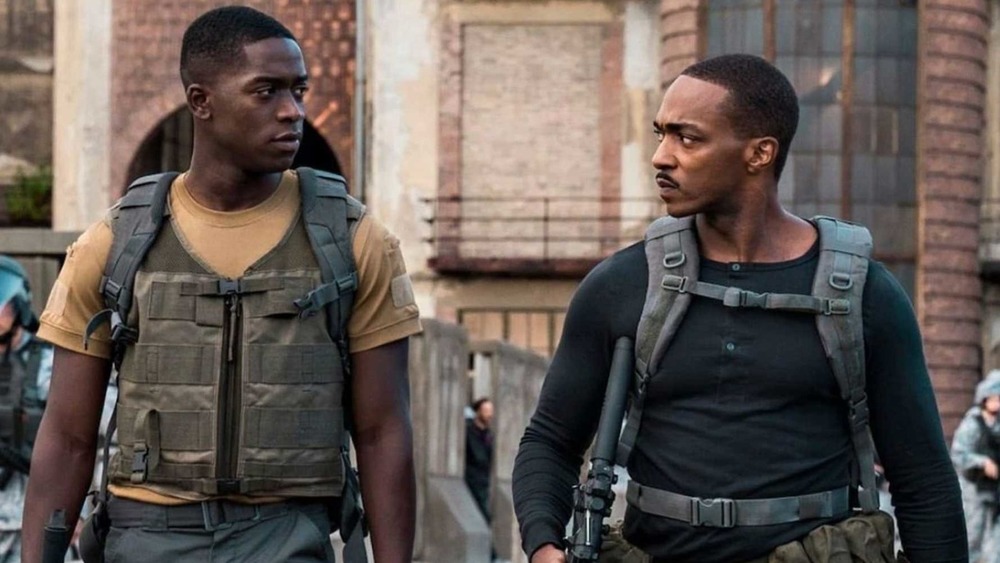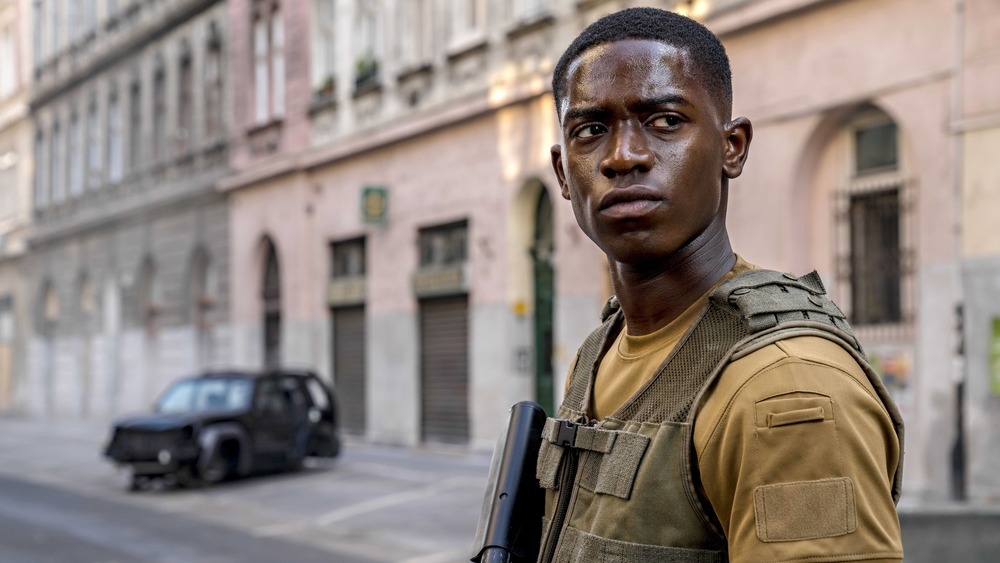The Ending Of Outside The Wire Explained
Contains major spoilers for Outside the Wire.
Sci-fi war thriller Outside the Wire is currently the top movie on Netflix, and with good reason. Director Mikael Håfström's movie takes the familiar setup of pairing an out-of-his-depth rookie with an experienced soldier and transports it to 2036 Ukraine. Robots fight alongside human soldiers in a war between the United States and Russia. The rookie is Lt. Thomas Harp (Damson Idris), a drone pilot who killed two Marines on the ground in order to save 38 others. As punishment for disobeying an order and killing fellow soldiers, he is sent to the frontline and assigned to Capt. Leo (Anthony Mackie), a sentient android and top-secret military experiment.
Leo takes Harp along with him on a mission to find a cache of nuclear codes and stop the weapons from falling into the hands of pro-Russian guerilla Victor Koval (Pilou Asbæk). Harp realizes that his experience as a drone pilot, dropping bombs on people in faraway lands from the comfort of a base in Nevada, has left him completely detached from the reality of war. He finally sees the consequences of violence once he's outside the wire, as the android teaches the man how to be more human.
Leo eventually secures the codes, at which point the android reveals to Harp that he's been tricking him into helping him carry out an unsanctioned operation, knocks him out, and leaves him behind. Harp figures out that Leo wanted the codes because he's planning to launch the nukes at the United States in a preemptive strike that he believes will prevent future war. So Harp, with the support of his commanding officer Col. Eckhart (Michael Kelly), goes after Leo, setting up the climax of the movie.
"I have to destroy the monster," Leo explains during the ensuing fight. "Destroy myself, my creator, the U.S. They need to understand that these wars must end. And I am the face of never-ending war." He tells Harp that sacrificing the people who will die is for the greater good, and Harp of all people should understand that.
"No. You're wrong," Harp insists. "Humans could learn to do better. That is the greater good, Leo."
Outside the Wire's explosive ending
After drone pilot Corp. Mandy Bale (Kristina Tonteri-Young) drops a bomb on the power plant, finishing off Leo and destroying the missile, the movie ends with Harp leaving his military base for home. He's returning to his life in the United States with a better understanding of the importance of human life.
It's unclear how Leo's plan to end America's forever war would have worked, since he was a top-secret project that only a select few people even knew existed. And since we didn't see him issue a manifesto or tell a journalist what he was doing or anything like that, there's no reason to believe his plan would even reach the public at all, let alone sway public opinion enough to force an end to American imperialism. It would have just seemed like a Russian attack on America, which would have made the war worse, not better. Frankly, the most way-out science fiction idea in the whole movie is that the military would respond to an attack on American soil by reducing aggression.
That being said, Leo had a justified belief –- that depersonalizing war reduces the humanity of its fighters and increases the suffering of its victims –- and a willingness to take a stand. His diagnosis of the problem was correct, but his treatment plan was tragically misguided. Harp, on the other hand, offers no solutions and shifts the burden of responsibility from "the American military" to "humans," as a whole. The extent of the lesson he learns seems to be that the people who die in war really are people.
In short, there's no easy answer to the deep flaws in either character's position. The morality of war is a tangle of questions with which we will, sadly, always be grappling.

